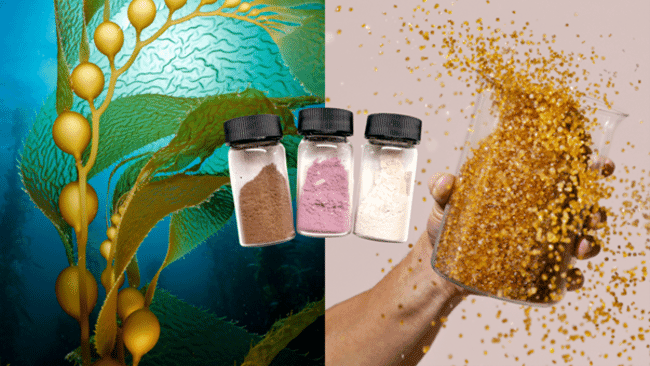
© Umaro
A project that aims to develop new processing techniques that upcycle alginate sidestreams from Umaro’s seaweed protein production into Sway’s seaweed-based bioplastics, has been awarded a US Department of Energy (DOE) Mixed Algae Conversion Research Opportunity (MACRO) grant of $1.5 million.
As global pressures mount against fossil fuel extraction and resource-intensive industrial agriculture, seaweed has emerged as a promising new feedstock for sustainable bioplastics, biofuels, and other bioproducts. Seaweed is naturally abundant, fast-growing, and requires no fresh water, fertilizer, or arable land. Seaweed is known as a regenerative resource for its ability to nurture habitats as it grows, improving water quality and boosting biodiversity. And importantly, seaweed is plentiful in natural polymers, the molecular building blocks that can be transformed into bioplastic.
Umaro is a pioneer in the development and commercialization of seaweed as a high quality source of protein. Its flagship product, a plant-based bacon made with red seaweed protein, is now available in Whole Foods stores throughout California. Umaro recently developed an innovative process for separating protein from kelp and is investigating sustainable uses for the polysaccharides left over from the process. That’s where Sway comes in. With newly unlocked funding from the DOE’s MACRO program, Umaro will work together with Sway, a company creating and commercialising home compostable, seaweed-based bioplastics. The collaboration will upgrade Umaro’s alginate-rich polysaccharides into a product well-suited for Sway’s innovative bioplastic products.
“With the right chemistry, seaweed has enormous potential to solve two problems at once: the need for sustainable materials and the need for sustainable proteins,” said Beth Zotter, CEO of Umaro, in a press release. “Until now, no commercial process could generate both of these products from the same piece of seaweed. We’re eager to collaborate with Sway to apply our breakthrough technology to their industry-leading seaweed bioplastics, while improving the unit economics of both our products simultaneously."
A breakthrough in bioplastics
Launched earlier this year, Sway’s TPSea is a first-of-its-kind pellet made entirely from seaweed and plants. Much like thermoplastic starch, TPSea can be extruded on its own or combined with compostable polymers through various manufacturing techniques to create an array of customised products with boosted renewable content. TPSea is currently used as the base of Sway Polybags, which are being piloted with fashion brands prAna, Faherty, Florence, and Alex Crane and will be available for purchase via sustainable packaging supplier EcoEnclose by end of the year. Looking forward to 2025, the Sway team will expand their product portfolio into new flexible packaging applications – a category representing approximately 40 percent of all fossil fuel-derived packaging – as well as new rigid formats.
Alginate, the polysaccharide derived from brown seaweed, offers several functional benefits when incorporated into bioplastic formulations. Its unique gel-forming properties and high viscosity make it an excellent thickening, gelling, and stabilizing agent. These characteristics enhance the mechanical strength and flexibility of bioplastics, enabling compatibility with traditional plastic manufacturing equipment and diverse applications, including packaging, films, and coatings – all of which are possible to manufacture using Sway’s TPSea resin.
“Through diligent research and development, Sway plans to increase the accessibility of our seaweed-based materials by utilising Umaro’s surplus alginate to lower our overall price point,” says Julia Marsh, CEO and co-founder of Sway. “Thanks to the support of the DOE, we also plan to enhance our material’s performance to tackle especially challenging categories of necessary packaging for fashion, home goods, and food – helping to avoid plastic pollution in the process!”
Among the exciting focus areas of the MACRO grant, support from the DOE will directly:
- Enhance Sway’s bioplastic formulations with improved mechanical and thermal properties.
- Create a scalable process for utilising surplus alginate from seaweed protein production.
- Boost positive environmental impact through the expansion of renewable resources and home compostable materials.
- Increase accessibility to and adoption of bioplastics through a lowered product price point.
- Generate increased economic opportunity and job stability for seaweed-supplying coastal communities most vulnerable to climate change.
A $20 million tranche of investments
This project is part of $20.2 million distributed to 10 university and industry projects to advance mixed algae development for low-carbon biofuels and bioproducts, spearheaded by the US Department of Energy’s Bioenergy Technologies Office (BETO) and Office of Fossil Energy and Carbon Management (FECM).
Located in seven states, these selected projects will address high-impact research and development (R&D) focused on converting algae, such as seaweeds and other wet waste feedstocks, to low-carbon fuels, chemicals and agricultural products that can decarbonise domestic transportation and industry.



